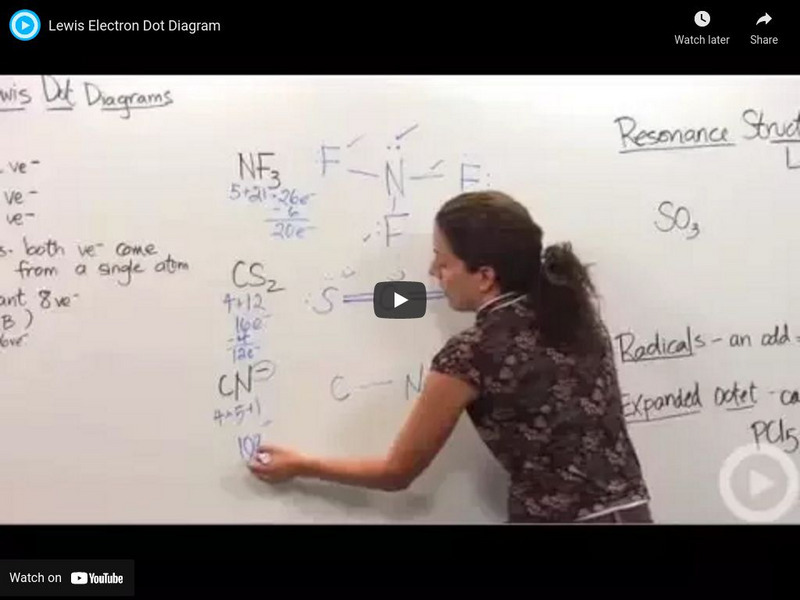Crash Course
Carbon... SO SIMPLE: Crash Course Biology
And thus begins the most revolutionary biology course in history. Come and learn about covalent, ionic, and hydrogen bonds. What about electron orbitals, the octet rule, and what does it all have to do with a mad man named Gilbert Lewis?...
SciShow
Oxygen is Killing You
Hank introduces us to oxygen - the element that makes it possible for most animals to live, but which is simultaneously responsible for a lot of bad things going on in our bodies.
Bozeman Science
Lewis Diagrams and VSEPR Models
In this video Paul Andersen explains how you can use Lewis Diagrams and VSEPR Models to make predictions about molecules. The Lewis diagrams are a two-dimensional representations of covalent bonds and the VSEPR models show how the...
Bozeman Science
Chemical Bonds: Covalent vs. Ionic
Mr. Andersen shows you how to determine if a bond is nonpolar covalent, polar covalent, or ionc.
Curated Video
Valence Electrons & Lewis Dot Diagrams - what are they and how do I draw them?
Valence electrons are the electrons in the outermost energy level of an atom. They are important because they are involved in the chemical bonding of our elements which helps determine the reactivity of elements. In order to be stable,...
Curated Video
Why does chemistry happen?! Element Stability and the Octet Rule!
Why does chemistry happen?? Why do ions form?? Why do elements bond together?? These are all important questions and the answer comes back to one very important principle in chemistry and that is element stability. Elements are stable...
Curated Video
Learn How To Draw Lewis Structures Easily: 4 Simple Steps For Perfect Chemistry Diagrams Every Time
Never draw a Lewis Structure wrong again! In this video, we’ll show you 4 simple steps to master the art of drawing Lewis Structures—an essential skill in chemistry that helps explain molecular behavior and the chemical and physical...
Schooling Online
Chemistry Properties and Structure of Matter: Properties of Matter - Chemical Properties of Elements
If movies have taught us anything, it’s that the first person to enter a spooky cave is the first to get in trouble! Will First Mate Phil survive to see the light of day? This lesson will shine a light on the chemical properties of...
Mazz Media
Predicting How Elements Behave
This videos provides a quick review of the octet rule and then goes on to describe how it can be used to predict the behavior of different elements and the bonds they form. Students will learn to relate patterns in the periodic table to...
Schooling Online
Chemistry Properties and Structure of Matter: Properties of Matter - Naming Binary Ionic compounds
This lesson will reveal the rules for writing the names and chemical formulae of ionic compounds, by balancing charges and using the cross method.
Definitions included: ionic compound, binary ionic compound, oxidation state
Catalyst University
Corrin/B12 Biochemistry: Cobalamin Adenosyltransferase
Corrin/B12 Biochemistry: Cobalamin Adenosyltransferase
Professor Dave Explains
The 18 Electron Rule for Transition Metal Complexes
Ok, so we understand how ligands bond to metals to form transition metal complexes, but how many ligands will fit? Well, remember the octet rule from general chemistry? There is a similar concept that we can apply here, which is called...
Schooling Online
Chemistry Properties and Structure of Matter: Properties of Matter - Naming Monoatomic Ions
This lesson will introduce the rules for writing the names and chemical formulae of non-metal anions and metal cations, including metals with multiple positive oxidation states.
Definitions included: compound, cation, anion, IUPAC,...
Mazz Media
Ionic and Covalent Bonding
In this video students will come to understand the basic difference between ionic and covalent bonding. Viewers will learn that covalent bonds form between non-metallic atoms that share pairs of electrons and covalent bonds form between...
msvgo
Covalent Compounds-Lewis structures
It explains the Kossel-Lewis approach to chemical bonding, octet rule, covalent bond and classify its different types, Lewis dot structures of covalent compounds.
FuseSchool
Covalent Bonding Of Hydrogen, Oxygen & Nitrogen
Learn the basics about the covalent bonding of hydrogen, oxygen and nitrogen as a part of the overall topic of properties of matter. The noble gas structure and covalent bonding is also discussed.
Mazz Media
Octet Rule
This video uses animation and introduces Lewis Structures to demonstrate stable and unstable electron configurations to explain the octet rule. The program shows viewers how they can use the periodic table to understand the octet rule....
Khan Academy
Khan Academy: Drawing Dot Structures
Introduction to drawing positions of electrons in Lewis Dot Structures. [14:42]
Brightstorm
Lewis Electron Dot Diagram
A video tutorial on how to draw Lewis Electron Dot Diagrams. [8:37]
Sophia Learning
Sophia: Lewis Dot Diagrams of Molecules: Double Bonds: Lesson 1
This lesson will demonstrate how to draw a Lewis dot diagram for a molecule which has a double bond. It is 1 of 2 in the series titled "Lewis Dot Diagrams of Molecules: Double Bonds."
Sophia Learning
Sophia: Lewis Dot Diagrams of Molecules: Triple Bonds: Lesson 1
This lesson will demonstrate how to draw a Lewis dot diagram for a molecule which has a triple bond. It is 1 of 2 in the series titled "Lewis Dot Diagrams of Molecules: Triple Bonds."
Sophia Learning
Sophia: Lewis Dot Diagrams of Molecules Single Bonds: Lesson 1
This lesson will demonstrate how to draw a Lewis dot diagram for a molecule that has single bonds. It is 1 of 2 in the series titled "Lewis Dot Diagrams of Molecules - single bonds."
Sophia Learning
Sophia: Octet Rule: Lesson 5
This lesson will define the Octet Rule and how this effects an atom's stability. It is 5 of 5 in the series titled "Octet Rule."






